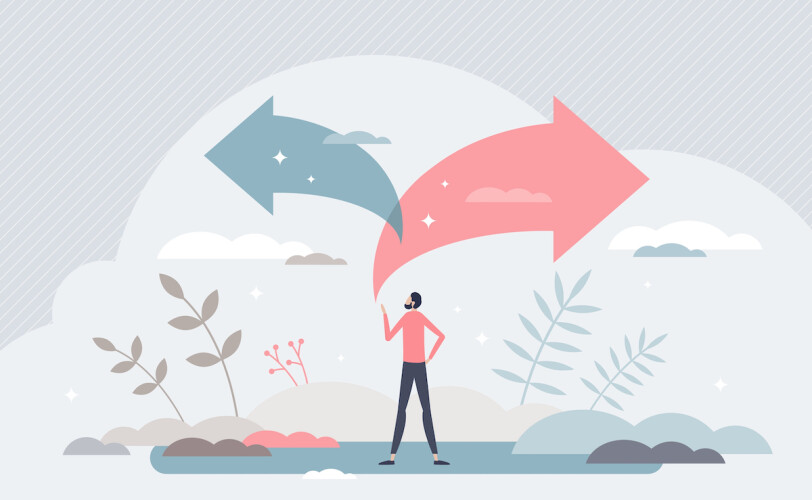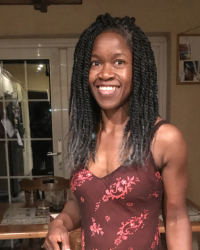A different type of New Year's resolution
It's the season for resolutions. New Year, new page, fresh start, etc… However, too many of us know too well that the resolve is unlikely to make it to the end of the month – let alone become a sustainable habit. So what goes wrong and what should we do instead?

It must be me!
If you are one of those people who look back ruefully at gym memberships used only a couple of times, treadmills repurposed as clothes horses or “diets” that only survived a week; you will know first-hand how difficult it is to keep many of the lofty promises we make ourselves – at the beginning of a New Year – or on our birthdays or at the start each new month or week…
Research shows that, typically, after one week 75% are successful. The number then drops to 71% after two weeks, dropping further to 64% after a month and after six months, only 46% of people are still successful at keeping their resolutions.
Some of the reasons cited for failure include not having enough time, not having enough money, it gets boring, life gets in the way, it just takes so much effort/head space… the list goes on...
Why does it go wrong so often?
The big difficulty is fighting against the compulsion to keep doing what you always did.
There are several reasons this is difficult.
1. Going against the grain
Choosing to make changes that work for other people but really do not suit your personality or body type. For example, your partner starts doing HIIT classes and loses the belly almost overnight. So you determine this must be just what you need even though the thought of all those squats and weights makes you feel sick before you even arrive at the gym – how are you ever going to keep that habit up?
2. Over ambition
You’d like to see rapid results – the TV shows and adverts tell you others are losing four stone in 12 weeks… so you throw yourself into a regime that leaves you perpetually hungry, tired and irritable – not to mention the skin, hair and gut problems you notice after a few weeks. It’s no wonder that you can’t wait to stop; and, once you do, you find yourself right back where you started in a blink of an eye!
3. Inertia/procrastination
We all find it so much easier to keep doing what we always did, so we say things like: “I’m going on holiday in a couple of weeks, best start after that…” Or, “We have an office event at the end of the month, let's get that out of the way first…”. Our brains are wired to take the path of least resistance because change can be threatening and can mean danger. Those thoughts about waiting till the beginning of the month are really our brain just trying to keep us doing the least threatening thing – i.e. staying the same.
4. Stress
The cause of stress might be relationship issues, work overload, loneliness, or disappointment at not achieving our goals – irrespective of the reason; when we are stressed we automatically look for ways to make ourselves feel better. Many of us have trained ourselves to use crutches like nicotine, alcohol, or food to give ourselves a “fix” of serotonin so we can feel good. Ironically, once the ”fix” wears off we now have feelings of guilt regarding our “lapse” to contend with – the guilt feelings, being yet another stressor, soon send us straight back to the “fix” we were feeling guilty about and the vicious cycle gets reinforced.
Keeping change simple and making change effective
When it comes to leading a healthy lifestyle, I come across too many people beating themselves up about their “lack of willpower”.
It is extremely difficult to achieve and sustain a healthy lifestyle through willpower alone. The main reason being, if you are relying on willpower, you actually creating a new stress that will increase cravings for the “fix” crutches (nicotine, alcohol, junk food) that you were trying to avoid in the first place!
This is why the two main areas I always end up working with my clients on are:
1. knowledge
2. mindfulness
Knowledge
This first one is obvious. Having more information about which habits serve our particular bodies and temperament can help us make informed decisions when we are choosing how to achieve that healthy lifestyle. “Superfoods” like avocado, nuts and seeds are great for us however overindulgence in these calorie-dense foods is not going to be very helpful if part of our health drive is to lose weight.
I remember many moons ago consuming a litre of orange juice each day because it is full of vitamin C right? What no one had told me was how much sugar I was consuming with my vitamin C.
By the way, it is worth noting that the term “superfood” was coined for marketing purposes by the food industry to influence food trends and get us buying new products.
Getting advice on which of your current habits might be impacting your health; and, what you can do differently in order enjoy an energetic, healthy lifestyle; will help you make the right decisions when confronted with choices.
The NHS website can be a good source of unbiased information however for obvious reasons, this is not personalised.
Working with a qualified coach can mean you get individualised advice based upon your circumstances – advice that works for a single professional who is always on the road is unlikely to be useful for a working, single mum who is extremely time-poor; and the advice would be different still for a cancer survivor looking to get back to normal and feel good again.
Mindfulness
This might seem very odd… but please bear with me…
So many of us want to change… but keep finding ourselves doing the same old things we used to do – and of course seeing no change. We berate ourselves for our lack of willpower and feel there must be something wrong with us.
Practising mindfulness is a tool that can help us:
- notice when we are repeating actions we had promised ourselves we would change
- recognise triggers that make us reach for the “fix” we already know is not helpful to us
- unravel the beliefs that lie beneath situations that make us feel stressed
- address relationships that are draining our energy in an up-front manner
Mindfulness has been described as the practice of purposely bringing one's attention to the present-moment experience without evaluation. This is a skill that can be developed through mindfulness coaching and meditation training.
Why would we want to see the present moment more clearly?
We all bring different “filters” to the way we see the world, based upon our previous experiences/social interactions and the beliefs we have formed as a result.
A very simple (silly?) example – two friends are talking to each other about the weather… friend A says, “it’s horrible here today, not warm at all and I’m going to have to cancel my picnic plans” friend B says, “we are so lucky today, it’s warmed up beautifully and we are heading out to the beach”. It turns out the temperature is the same in both places – 23C! Friend A is in Sydney and has grown to expect temperatures nearer the 30s while friend B is in Bournemouth and is delighted with anything over 20C.
We regularly judge situations we face based on beliefs and filters that are past their due date. Mindfulness helps us notice these judgements and can allow us to be much more objective, thereby making the situations less threatening therefore generating much less stress.
There are lots of books available to learn more about practising mindfulness.
Working with a coach to learn mindfulness can help you achieve the results you are looking for more quickly, as a good coach will help you focus on the specific beliefs that are the biggest triggers for your own stress responses.
A good coach will be an objective companion who asks challenging questions about your responses to situations and stops you from letting yourself off the hook when you see parts of yourself that you do not really like.
It is the act of confronting the aspects we do not like that allows us to make real change that impacts physical, mental, and spiritual health.
A word of caution
There is no “quick fix” for achieving a healthy lifestyle.
Taking time to get wise to what works for you and mastering mindfulness, will do just that – take time!
However, this reflects two things:
1. The time it took to develop the habits you are looking to break – no one goes from being and feeling perfectly healthy one day and waking up with high blood pressure the next! It was a slow almost imperceptive slide with little niggles being ignored along the way…. The time to recover will be nowhere near as long as the original slide had been, but you should anticipate it will take months not weeks.
2. The fact that you are developing a lifestyle that will support you for the rest of your life – no diets, no guilt feelings, just energy and the freedom to live your life the way you want. Is this not worth taking a little longer?
Want more?
I hope this article helps you on your journey towards achieving a healthier, happier you.
If you’d like to talk through your goals and get some personalised advice on how you can stay true to your resolutions, book a complimentary conversation by clicking the 'email me' button below.

Find a nutritionist dealing with Healthy eating
All nutrition professionals are verified






